About once a week, we get asked: “How long does it take for an affiliate site to succeed?”
Today, we're going to attempt to answer this from every situation, angle, and path we can think of.
All in hopes to really prepare you for what's to come.
Not only can a content site change your life with additional income, but if you work hard at it, it can pay off immensely and become your sole career. Just check out some of these success stories for additional guidance and inspiration.
In our eyes, the most realistic answer to how long it takes is “it depends”.
It's very similar to asking and knowing how long it takes for a restaurant to succeed – which is nearly impossible.
In the example of a restaurant, it depends on your location, niche, prices, timing of the economy, and even your team or partner.
For affiliate sites, success depends on a few definite factors:
- Your commitment in terms of time, compared to your direct competitors (aka others going for that keyword)
- Your niche; is it seasonal, evergreen, just a fad?
- The quality of your content
- The number and quality links pointing to your content
So right off the bat, we know that ALL of those points above play some part in the success of your site.
For the most part, we can help you out with all of that except for your commitment.
We'll talk more about time below but keep in mind that our most successful clients are so dedicated to their project that they are practically obsessed.
Not necessarily obsessed about their niche, but obsessed about making it work.
Suggested Readings:
– How Jamie Built a Site Earning $4,000/mo In 16 months
– Alex's Lessons On Growing a Site To $1,000/mo In 10 Months
– Ben's Journey To $700/mo In 16 Months
How Success Is Defined For Affiliate Sites
In our eyes though, the question of “success” falls into 3 main categories:
- Rankings
- Earnings
- Time
When people see an uptick in their earnings and rankings while spending less time on their site, they're generally in a pretty happy place.
Now it's not all fun and games leading to that point and right off the bat I'll say that spending less time on your site shouldn't be your goal for now.
That's probably putting the cart in front of the horse at this point, if you know what I mean.
What Do I Need To Know To Get Started?
Honestly, if you can write credibly and consistently, plus know your way around Google that's really all you need.
Yes, we provide WordPress training, SEO tutorials, and more than a solid baseline to start with but everything you need is probably already in your brain.
We see people getting bogged down by the tech stuff (hence why we have an entire business based around helping folks with that) but you can learn all that stuff in time.
No ones expecting you to be a WordPress expert from day 1.
If you can run a search like “best dog bowls for 2021” on Google, open every page, choose the ones with the best information, rewrite it with your own flavour and add additional insight…
Then you can make this business work.
All that technical stuff can comes later and the most important thing is content.
I can't stress that enough: content, content, content.
Your site is like a little home on the internet and every piece of content is an additional room. If you want to build a mansion, you need to have more rooms right?
1) When Should My Site Get High Rankings?
It depends on the keyword, but some sites can gain rankings almost immediately if the competition is so low.
Great rankings can be achieved fairly quickly for 0 competition keywords.
This is mostly where the Keyword Golden Ratio specializes.
However, most of these low competition keywords aren't “buyer keywords” and those are ultimately the most valuable.
You're probably now wondering “how long does it take to rank for those ‘best X' type of keywords?”
Based on what we've seen in the past with our sites, our customers, and our friends, the average hard working person can start gaining traction for competitive buyer keywords in 6 to 10 months.
But the caveat is that some buyer keywords are easier than others.
So please don't ask us why you haven't reached the first page for a buyer keyword with a difficulty level of 45 when the max you should be going for is 10 (according to Ahrefs keyword tool.)
Working everyday for 10 months for pennies might seem ridiculous but after that first dollar comes many more will too.
Some sites will grow exponentially after they start seeing initial traction and Google slowly begins to pass the love.
Sidenote: You can still be in the Google Sandbox when your rankings are high. Those keywords just have super duper competition.
Below are some examples of sites we've added content to that targeted low competition keywords and a screenshot of their performances after:
Example #1: Many of these are Authority Sites with 50,000 words added & built in May last year.
10 white hat links were built to the site in August/September.
30,000 more words were added in October.
No other work has been done on the site.
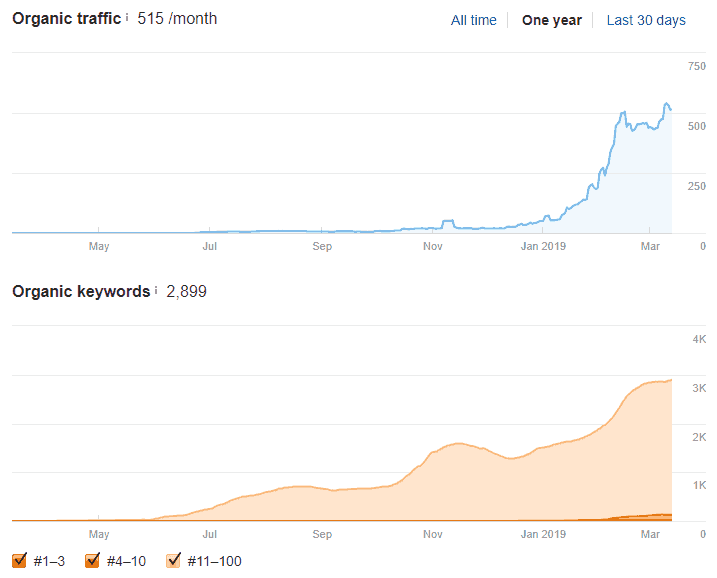
Example #2: This is a site that the client purchased from a broker, and then wanted to invest in more content to bring it to the next level. It worked really well:
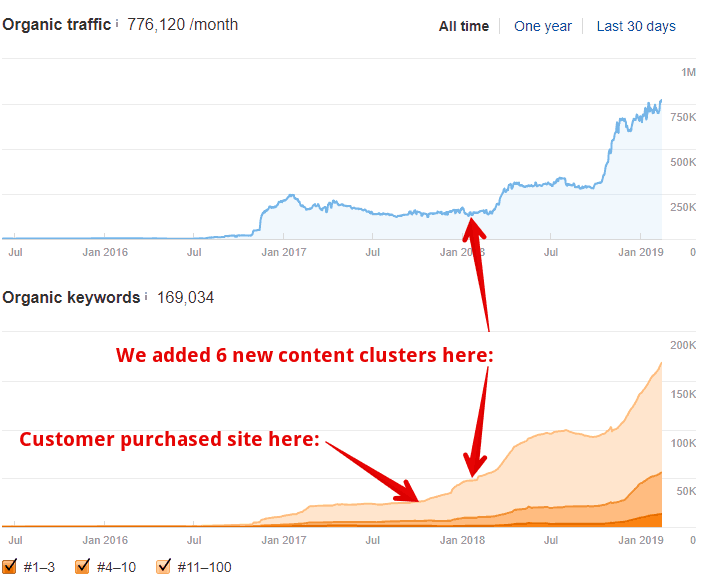
Example #3: We added 40,000 premium words to this one.
Nothing else has been done other than uploading content and then letting it sit. We don't recommend letting a site just sit, but even without additional work the site is growing.
Ahrefs shows 22 referring domains, but they are all just junk links that every site seems to pick up some of.
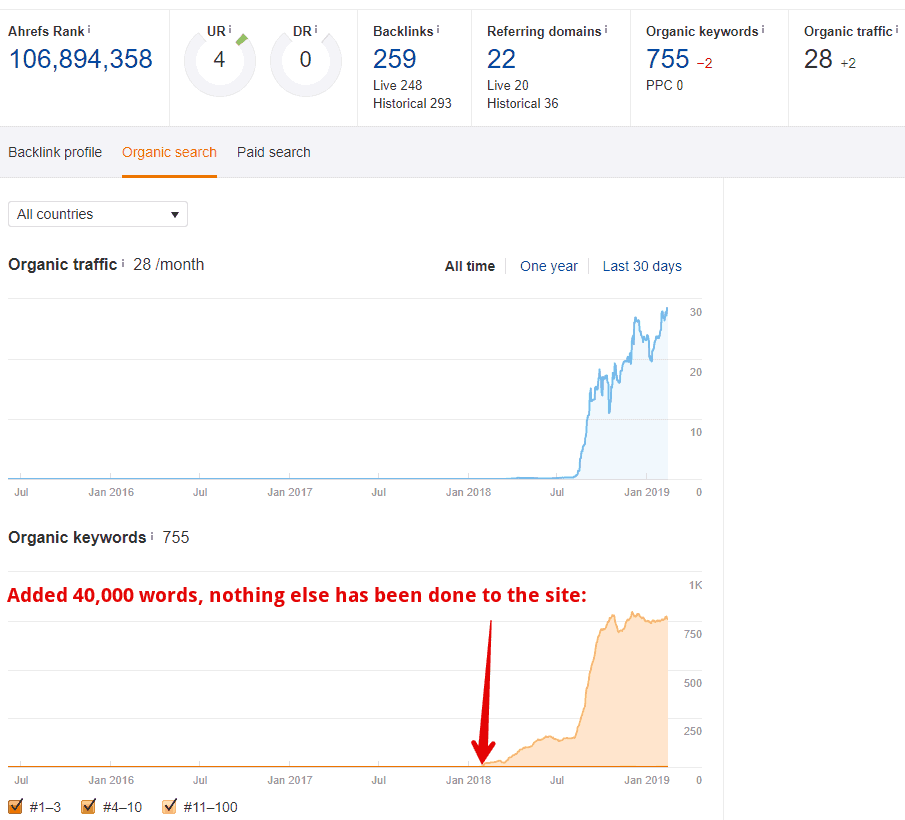
Example #4: This is an Aged Site.
Originally built in Nov and was purchased several months later.
Only content has been added and the 7 referring domains are similar to junk links from the last example.
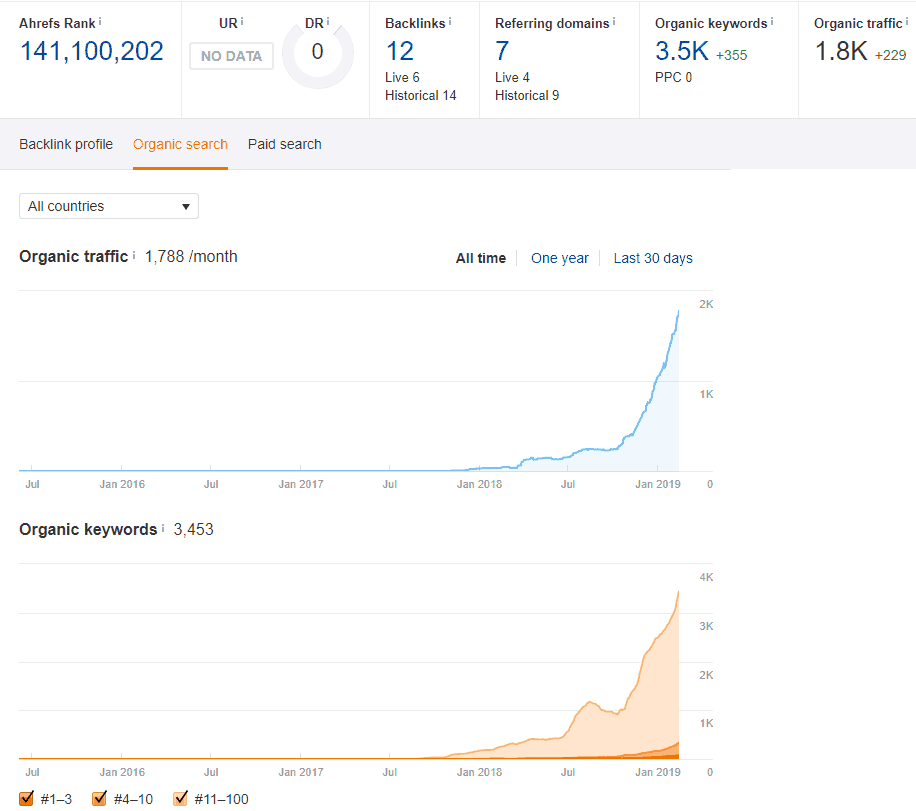
The owners of these sites were, and are still, very ambitious folks. In order to replicate their success, here are some tips:
- Get an aged site (see them here)
- Get a clean/relevant aged domain
- Attack very very low competition keywords (even with 0 estimated traffic and information oriented)
- Write some content yourself first to understand the niche, then outsource the writing. It'll make your instructions to writers better.
- Aim to work on at least 1 blog post a day (write, copyedit, on-page SEO, etc.)
2) How Long Till My Revenue Reaches The “Freedom” Level?
Everyone's level of “freedom” is different.
Some believe $500 extra a month is good enough, others won't settle till it's a $30K/month site.
When we interviewed Marty (a member of the HPD community), he mentioned getting his first commission at just a couple cents within 10 months and being ecstatic.
That's because it started to jump up from $500 to $1,000 in a matter of 4 months.
Keep in mind that the majority of affiliates see massive jumps in December and Marty's case was no different.
Although Marty has great supplemental income, he's definitely not where he wants to be or ultimately reach.
In Example #4 above, the site has grown tremendously in the first 6 months. The owner has taken hold of it and the earnings in the last 30 days were $813.48 (with just over 6 months of hard work.)
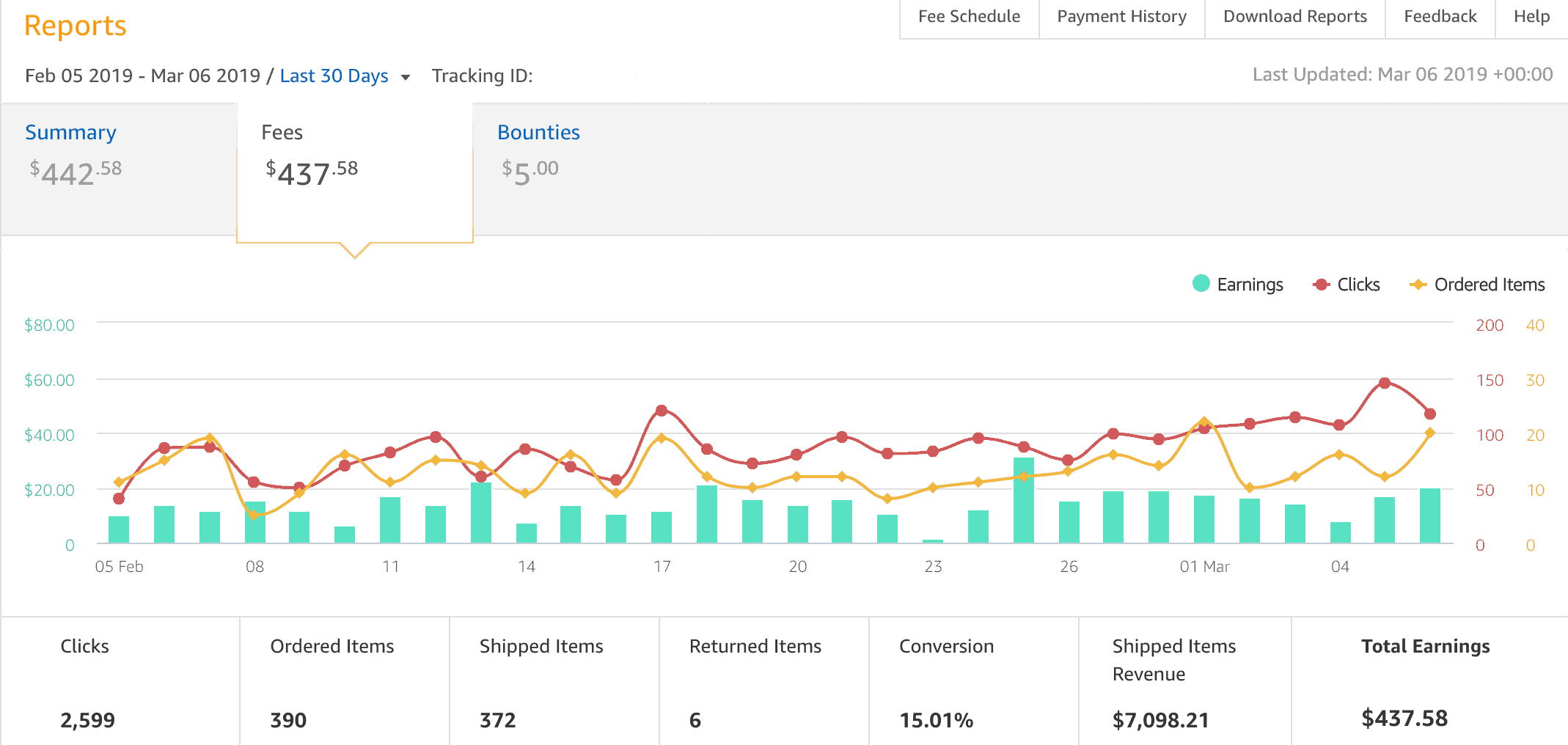
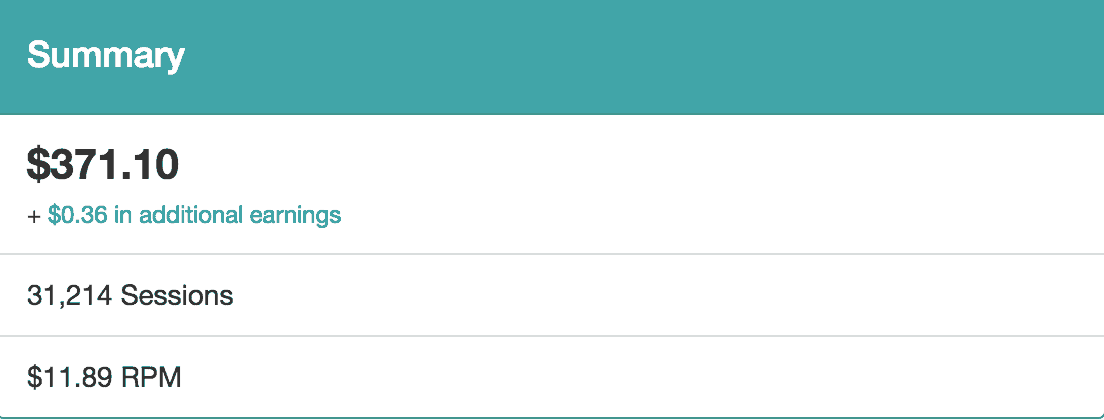
Sidenote: This client was able to join a premium ad network with his other site and from that was able to get premium ads on his HPD aged site. This won't be replicate-able for newbies who aren't in these networks, but you can certainly get there or work out private ad placement deals. Also, note that the Amazon commissions are higher than the ad revenue.
To hear more success stories, head over here:
How Marty Generates $1200/mo From His Authority Sites
How Jaron Built 2 Sites That Bring In $10,800/mo
With all this in mind, allow me to set your expectations for certain traffic channels and their correlation to potential affiliate revenue:
- Google traffic = Best for catching buyers at the exact moment of decision
- YouTube traffic = Helpful in converting buyers, but there are many more distractions and competitors directly within eye sight
- Facebook groups = Should be used for awareness. Don't depend on it to organically convert buyers. Social selling is a unique art form and over all social media presence can be handy for brand building.
- Ads = Search engine ads are better than social media ads, but SE ads are usually more expensive. Social media ads are useful in creating awareness and reminding folks. It's hard to master ads and it requires quite a bit of experimentation. Listen to the podcast below for more insight.
Suggested Listening:
How Monica Runs Facebook Ads To Earn Affiliate Commissions
“That all sounds great, but I don't have enough time to be on every channel so what should I focus on?”
Great question!
If I were you and just starting out, I would focus on SEO, Pinterest, and niche relevant FB groups.
SEO is a must but can take a while so be smart and target your content towards pleasing search engines + social media.
We also like Pinterest because it's a search engine for blog posts and you can automate a lot of the work.
(We walk you through Pinterest automation in our course, the Human Proof Method.)
FB groups are also great too because you'll learn all about what really matters to your audience.
It'll help you create unique content ideas and if you can match those with low competition keywords then you are going to be light years ahead of the rest.
3) How Long Till I Invest Less Time Into My Site?
It only makes sense to consider spending less time on your site after you've first gone head first to see how far you can really go with it.
Otherwise you're already dead in the water because your competitors will have a bigger fire under their @$$ than you.
Here's a cool fact though:
With affiliate SEO, you are spending more time at the beginning to build your site, then as your income and rankings rise, you have the OPTION of spending less time on it.
If you want to take a week off, then you can expect business to go along as usual since you're not involved with customer support or anything.
You simply drive the traffic and help convert the customers into buying.
If we can think of the big picture and break a site's road map into major milestones, that should help you envisage “what life could be like afterward.”
For example:
- Phase 1: SEO – 20 hours per week
- Phase 2: Pinterest System – 2 hours a month
- Phase 3: Preparing Business Processes – 3 weeks of work, small bits of maintenance after
- Phase 4: Sell – 15 hours per week for 3 months to prepare for the sale of the site (answering buyer questions, due diligence, accounting, etc.)
Sidenote: Most people that earn $500-$1000/month start by working 20-40 hours/week at least.
As you can see, the amount of time you commit to your site won't necessarily decrease until after phase 3 and even at that stage, I still wouldn't recommend slowing down too much.
In fact, I don't think you will want to slow down.
For most people, once you get the money coming in, it's very hard to stop thinking about getting your site to the next level.
Step into this business with the intention of building systems so that you can concentrate on bigger money-making activities.
Let your VA and writers handle the rest.
How Much Can You Sell A Site For?
Right now, content sites are valued at a multiple of their average revenue or profit.
The simplest calculation is to multiply the last few month's average revenues (or profit) and multiply it by 25 to 35.
For example, if a site is earning $1,000 a month then it's estimated value would be $25,000 to $35,000 in today's average market rate.
Interestingly enough, the multiples for content sites have risen steadily since we started flipping them a couple years ago so the ROI has been quite nice.
It was around 20x when we started and have seen multiples all the way to 40x now.
Every deal is different so it depends how badly the buyer wants the site.
Let's have a look at a real-life example from Empire Flippers, which is a marketplace for selling these sites:
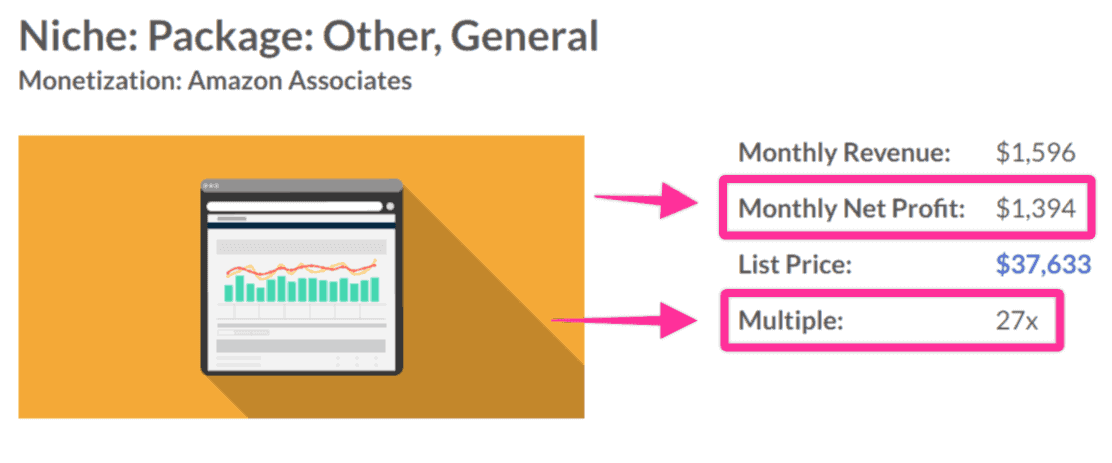
This example is a multiple of “profit” but sometimes you'll also see multiples based on revenue too. It just depends on how the broker values it.
It's not always exact math either.
Sites that utilize PBNs (private blog networks) can often times have lower multiples or perhaps the broker has an opinion on the market's appetite for your niche.
Though on the flip side for PBNs, sites that use them can get to profit faster so the ROI is better in some cases.
People DEFINITELY still buy sites with PBNs (because they work) so don't think it's evil to use them or that a site won't sell.
If it were the case that people didn't buy them then Empire Flippers, FE International, Quiet Light Brokerage or any other brokers wouldn't sell them or find value in them.
Experienced buyers know all these factors in multiples and you'll also learn them in time.
But you need a site first! So let's not get too far ahead of ourselves.
Suggested Readings:
Flipping Websites: Learn Multiples, Due Diligence, & More
Your First Year: 2 Tracks To Success & 1 To Failure
Before getting started, I want you to consider how ambitious you truly are about changing your life and using this business model and our methodology as your way to get there.
Start off by getting a piece of paper, create 4 quadrants on it like so:
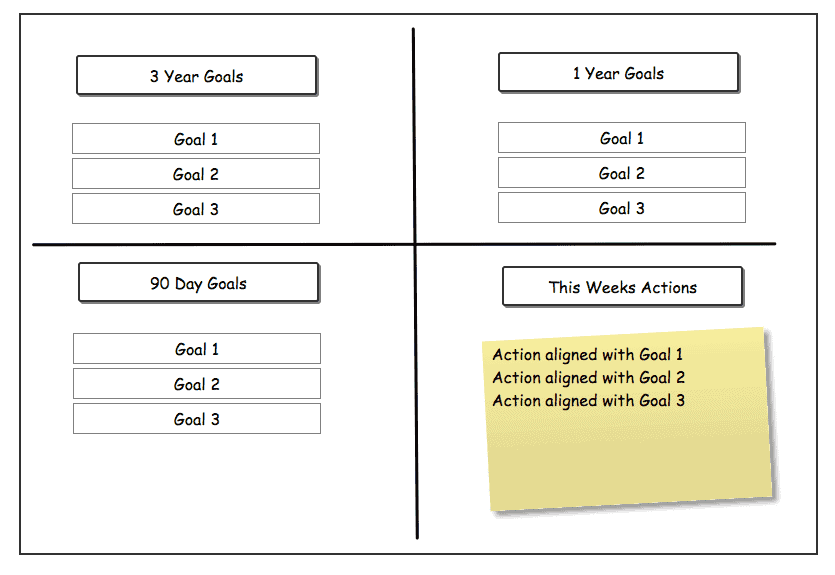
The point of the sticky note at the bottom-right is meant to help you stay aligned with your grandiose goals in the other quadrants.
Alright, now that you've got a framework for goal setting, let's talk about the different situations we've seen pop up from customers who purchase one of our sites:
A. They don't do anything, just let the site age = 0% chance of success
B. They work 1 hour a day on the site = “deep work”
C. They work 1 hour on weekdays, 6 hours per day on weekends
If you choose track 1 on purpose or accidentally, you won't have the opportunity to shift your life in the direction you want.
All you have to do is check out the success stories section of our site to see that no one who makes it into there took track A.
On another note, the difference between B & C isn't necessarily time, but simply “obsession.”
Folks that fall into track C are thinking about how to improve their sites, themselves, and their network all the time.
I know we can't ask for this type of commitment from you now, but get started on track B at least… Then you will naturally start lining up into Track C.
How Do We Get Started
You're already in the right place so the first thing I'd say is to start brainstorming niches.
Open up an excel spreadsheet or open up the note taking app on your phone, sit down for 15 mins and brain dump every niche under the sun.
Next, reach out to our custom site team and we'll try and give you some guidance.
If you already know 100% what you're going for and want to set it all up yourself…
Then pick up the Human Proof Method course and we'll give you our systems and the backing of a team committed to your success.
Every client is added into our private FB group and this group will be an invaluable part of your journey.
Building an income generating website has already helped so many people, so why can't it be your turn?


I’m wondering if you have any real-world examples of successful affiliate websites?
Hi
Somehow, someway, you gave me Valuable information for ranking a website on the google page.
Phase 1: SEO – 20 hours per week
Phase 2: Pinterest System – 2 hours a month
Phase 3: Preparing Business Processes – 3 weeks of work, small bits of maintenance after
Phase 4: Sell – 15 hours per week for 3 months to prepare for the sale of the site.
I think the above schedule is enough for driving my website to the SERP pages.
Thank you so much. Very nice post you have written!. This post is very helpful for me to learn about affiliate marketing. Keep posting such wonderful posts.
informative post
Your Article Push me to Grow my Blog and Never Give Up
Thank You for your thoughtful not. I have recently join SEO and hope this information will help there.
I have been doing SEO for my site the last month.
and every time I am more infromado thank you very much for all the information, http://brokersconfiables.com/
Hey, Kelvin
great insight. love your all post
keep writing
Best tricks for SEO . Thanks for sharing these blog.
I’m wondering if you have any real-world examples of successful affiliate websites?
Sure, check out these: https://www.humanproofdesigns.com/amazon-affiliate-websites-start-today/
Great post. Worth applying. Thanks for sharing.
Very useful tips and tricks. I am been doing SEO for my site past 1 month. Now I will apply this method.
Thank You. Keep Posting